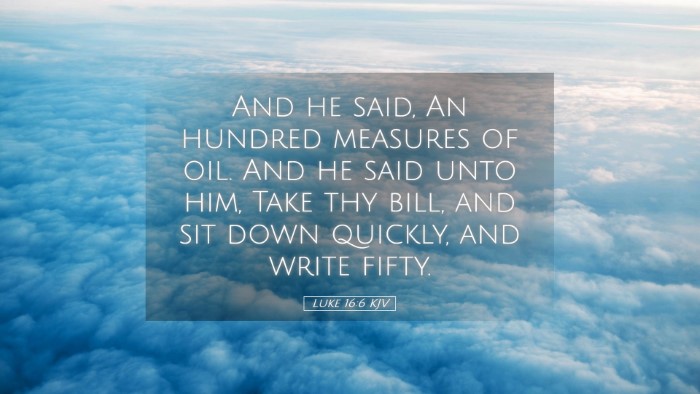Commentary on Luke 16:6
In this verse from the Gospel of Luke, we encounter a significant parable that elucidates themes of stewardship, cunning, and divine justice. This commentary aims to synthesize insights from several public domain sources, including Matthew Henry, Albert Barnes, and Adam Clarke, providing a comprehensive exploration suitable for pastors, students, theologians, and scholars.
Text of Luke 16:6
"And he said, An hundred measures of oil. And he said unto him, Take thy bill, and sit down quickly, and write fifty." (Luke 16:6, KJV)
Contextual Background
This verse is located within the Parable of the Unjust Steward, a narrative that addresses the character and actions of a steward who is facing dismissal for mismanagement. The context is essential to understanding the implications of the steward’s actions and the teachings of Jesus regarding worldly wisdom in relation to spiritual realities.
Stewardship and Accountability
Both the parable and the specific actions recounted in Luke 16:6 highlight the theme of stewardship. The steward's role was to manage the resources of his master responsibly. However, he was found to be wasteful and unfaithful. Matthew Henry notes that God expects His people to be faithful stewards over the gifts and resources entrusted to them.
Cunning and Wisdom
The steward, upon realizing that he was to be dismissed, exhibits a form of cunning by proactively reducing the debts owed to his master. Albert Barnes points out that this seemingly shrewd maneuvering potentially secures future support from those debtors. This action is illustrative of the wisdom that Jesus often commended when it was used in righteous ways.
Interpretation of the Measures of Oil
The "hundred measures of oil" refers to a significant debt incurred by a debtor, and the steward reduces this debt to "fifty measures." Adam Clarke observes that this reduction serves not only as a means of ingratiating himself with the debtor but also serves as a socioeconomic commentary on debt relief and social justice.
Moral Complexity
The actions of the steward present a complex moral scenario: he uses deception and discounting to secure his future, which might initially appear unethical. However, the essential lesson centers on the need for wisdom in dealing with worldly matters. Henry writes, “The children of this world are in their generation wiser than the children of light,” emphasizing the call for believers to be astute and proactive in their spiritual lives.
Theological Insights
This passage provides rich theological insights into the nature of God’s expectations and the character of human agency.
God's Justice
The parable highlights God’s ultimate justice. The master’s response, in light of the steward’s actions, compels readers to reflect on how God evaluates our stewardship. Even when humans act unjustly, God’s righteousness prevails, and His ultimate plans remain unthwarted.
Application to Believers
For contemporary believers, this verse challenges the church to consider how they manage not only financial resources but also spiritual gifts and responsibilities. As Barnes asserts, believers must act wisely and thoughtfully in the face of their mission in the world.
Implications for Mission and Evangelism
The wise management of resources and relationships extends to evangelism and ministry. The steward's actions, though flawed, prompt us to think about how we engage others with the Gospel message. Clarke emphasizes that the Gospel must be coupled with wise and reasonable conduct to impact lives effectively.
Conclusion
Luke 16:6 serves as a profound reminder of the call to diligent stewardship and the cunning, yet righteous, management of our resources. As faithful stewards of God’s gifts, Christians are challenged to navigate worldly situations with wisdom and integrity, ensuring that all actions align with God’s overarching justice and love.
Ultimately, this verse invites reflection on the balance between worldly wisdom and divine principles. The insights drawn from Matthew Henry, Albert Barnes, and Adam Clarke help articulate a deeper understanding of this dynamic relationship, emphasizing the need for believers to engage with the world wisely, unapologetically, and faithfully.


